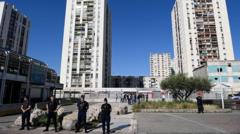Prominent environmental activist Boniface Mwangi has been charged with facilitating terrorist acts linked to last month’s anti-government protests in Kenya, which resulted in numerous fatalities. His arrest has drawn widespread condemnation from human rights organizations.
**Kenyan Activist Boniface Mwangi Charged as Government Escalates Crackdown on Dissent**

**Kenyan Activist Boniface Mwangi Charged as Government Escalates Crackdown on Dissent**
Boniface Mwangi’s arrest has ignited international outcry as human rights defenders rally against the Kenyan government's oppressive measures.
The Directorate of Criminal Investigations in Kenya has accused Mwangi of offenses pertaining to the facilitation of terrorist acts and unlawful possession of ammunition. Evidence reportedly seized from his home and office during an investigation includes electronic devices and tear gas canisters. This legal action against Mwangi comes in the wake of violent protests on June 25, where at least 19 individuals lost their lives due to clashes between police and demonstrators, according to the Kenya National Commission on Human Rights (KNCHR).
The unrest was prompted by widespread discontent with the government, and Mwangi’s arrest has triggered a strong backlash from a coalition of 37 rights organizations, who have labeled the accusations as unfounded. This coalition expressed concern over what they view as an alarming trend of repression against activists and critics of the government.
Interior Minister Kipchumba Murkomen characterized the protests as "terrorism disguised as dissent," further fueling claims of governmental overreach. The situation has been exacerbated by additional protests earlier this month that resulted in even more fatalities, with allegations of police violence and excessive force surfacing.
Political figures, including Siaya County Governor James Orengo, have criticized the government for its increasingly authoritarian stance, suggesting it is misguided to label young activists as terrorists. Historically, Mwangi has had a tumultuous relationship with Kenyan authorities, having faced multiple arrests and harassment during previous protests, including a past incident in Tanzania where he claimed to have been subjected to torture.
As the situation in Kenya continues to evolve, it raises pressing questions about the state of democracy and human rights protection in the country. Activists and international observers remain vigilant, calling for accountability and justice in the face of escalating repression.
The unrest was prompted by widespread discontent with the government, and Mwangi’s arrest has triggered a strong backlash from a coalition of 37 rights organizations, who have labeled the accusations as unfounded. This coalition expressed concern over what they view as an alarming trend of repression against activists and critics of the government.
Interior Minister Kipchumba Murkomen characterized the protests as "terrorism disguised as dissent," further fueling claims of governmental overreach. The situation has been exacerbated by additional protests earlier this month that resulted in even more fatalities, with allegations of police violence and excessive force surfacing.
Political figures, including Siaya County Governor James Orengo, have criticized the government for its increasingly authoritarian stance, suggesting it is misguided to label young activists as terrorists. Historically, Mwangi has had a tumultuous relationship with Kenyan authorities, having faced multiple arrests and harassment during previous protests, including a past incident in Tanzania where he claimed to have been subjected to torture.
As the situation in Kenya continues to evolve, it raises pressing questions about the state of democracy and human rights protection in the country. Activists and international observers remain vigilant, calling for accountability and justice in the face of escalating repression.





















